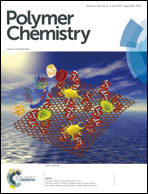Thiourea modified polyethylenimine for efficient gene delivery mediated by the combination of electrostatic interactions and hydrogen bonds†
Abstract
Branched polyethylenimine (PEI, weight-average molecular weight = 25 kDa and number-average molecular weight = 10 kDa) is one of the most studied nonviral gene carriers and represents the gold standard due to its relatively high transfection efficiency compared to most other cationic polymers. The thiourea (TU) group is reported to be a strong hydrogen bond donor and is able to interact with the phosphate group, which is a part of nucleic acids. Here, a series of methyl thiourea modified PEI copolymers (PEI-MTUs) with different contents of MTU were synthesized by a simple and efficient reaction between methyl isothiocyanate and PEI. The obtained PEI-MTUs were exploited as nonviral gene carriers. The best pDNA transfection results of the PEI-MTUs showed a 7-fold improvement in transfection efficiency compared with PEI, measured by luciferase reporter gene assay. The enhanced green fluorescence protein (EGFP) expressing results determined that up to 90.3% of cells were EGFP-positive, determined by flow cytometry, while PEI showed only 58.6%. At the optimal transfection ratio, the cytotoxicities of PEI-MTUs were much lower than that of the parent PEI. Furthermore, the destruction of the hydrogen bonds between MTU and phosphate groups by the addition of free phosphate resulted in an up-regulated mass ratio for complete retardation of DNA, indicating that the hydrogen bonds play an important role in DNA binding. Moreover, confocal laser scanning microscopy results revealed that the enhanced gene transfection efficiency was due to the efficient delivery of DNA into nuclei. Therefore, the MTU modified PEIs are potential gene carriers for future gene therapy applications.


 Please wait while we load your content...
Please wait while we load your content...